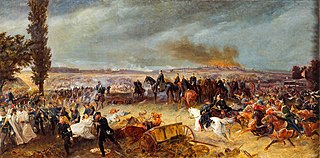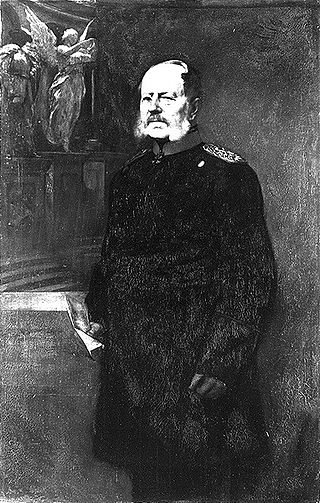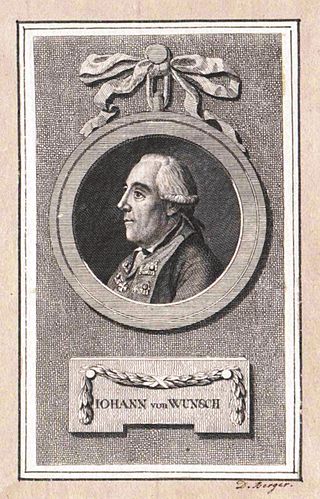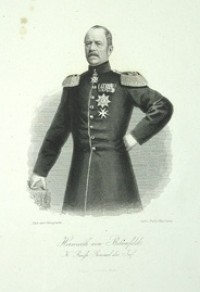
The Battle of Königgrätz was the decisive battle of the Austro-Prussian War in which the Kingdom of Prussia defeated the Austrian Empire. It took place on 3 July 1866, near the Bohemian city of Hradec Králové and village of Sadová, now in the Czech Republic.

Prince Friedrich Karl Nikolaus of Prussia was the son of Prince Charles of Prussia (1801–1883) and his wife, Princess Marie of Saxe-Weimar-Eisenach (1808–1877). Prince Friedrich Karl was a grandson of King Frederick William III of Prussia and a nephew of Frederick William IV and William I.

Duke William of Württemberg was an Austrian and Württemberg General.

Karl Eberhard Herwarth von Bittenfeld was a Prussian Generalfeldmarschall. He served in many military conflicts throughout the 19th century and was given major commands throughout each conflict.
The 13th Division was a unit of the Prussian/German Army. It was formed in November 1816 in Münster in Westphalia as a troop brigade and became the 13th Division on September 5, 1818. The division was subordinated in peacetime to the VII Army Corps. The division was disbanded in 1919 during the demobilization of the German Army after World War I. The division was recruited primarily in the Prussian Province of Westphalia and two small principalities in the Westphalian region, Lippe-Detmold and Schaumburg-Lippe.

Martin Wilhelm Remus von Woyrsch was a Prussian field marshal, a member of the Prussian House of Lords from 1908 to 1918, and an Ehrenkommendator or Honorary Commander of the Order of St. John.

Johann Jakob von Wunsch (1717–1788) was soldier of fortune and Prussian general of infantry, and a particularly adept commander of light infantry. The son of a Württemberg furrier, he served in several armies in the course of his lengthy career.

Hugo Ewald Graf von Kirchbach was a Prussian general who commanded the Prussian V Corps during the Franco-Prussian War.
The Battle of Hühnerwasser (Kuřívody) was the first battle of the Austro-Prussian War. It was the first engagement in the opening days of the Königgrätz campaign, fought in Bohemia on 26 June 1866. It was fought between troops of the Prussian Elbe army under General Herwarth von Bittenfeld and troops from the Austrian I Corps, led by Leopold Gondrecourt.

Friedrich Johann Daniel Alois, Freiherr von Zoller was a Bavarian lieutenant-general who fought in the Napoleonic Wars.
The following units and commanders took part in the Battle of Königgrätz on July 3, 1866. Compiled from the Prussian Army's Official History of the war.
August Christoph Viktor von Kleist was a Prussian Major General

Hans Adolf Julius von Bülow was a General of the Artillery in the Imperial German Army. He was the Inspector-General of Artillery from 1879 to 1882. He retired when he had conflicts with Georg von Kameke, the Minister of War.
The First Army was a Prussian formation during the Austro-Prussian War. Being a wartime organization of the Prussian Army; it afterwards was demobilized.

Oskar Ernst Karl von Sperling was a German major general who served during the Baden Revolution and the Second Schleswig, Austro-Prussian, and Franco-Prussian wars. He was the father-in-law of Paul von Hindenburg and maternal grandfather of Erich von Manstein.
The Army of the Elbe was a Prussian formation during the Austro-Prussian War. Being a wartime organization of the Prussian Army; it afterwards was demobilized.

Oskar Freiherr von Zoller was a Bavarian Lieutenant general who was known for serving at the Battle of Kissingen during the Austro-Prussian War, being killed during the fighting.

Christof Gottlieb Albert Freiherr von Barnekow was a Prussian General of the Infantry who commanded the 16th Division during the Franco-Prussian War and was a recipient of the Order of the Black Eagle.

Hermann Karl Rudolf Gebhard von Alvensleben was a Prussian Generalleutnant who participated in the Austro-Prussian War and the Franco-Prussian War. He commanded the 1st Cavalry Division during the Battle of Königgrätz and commanded several Army Corps' during the Franco-Prussian War.

Friedrich Adrian Herwarth von Bittenfeld was a Prussian General of the Infantry. He was known for being the younger brother of Field Marshal of Eberhard Herwarth von Bittenfeld and commanding the 4th Division during the Austro-Prussian War.














